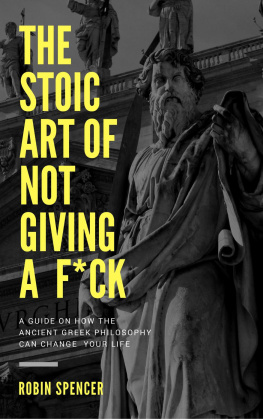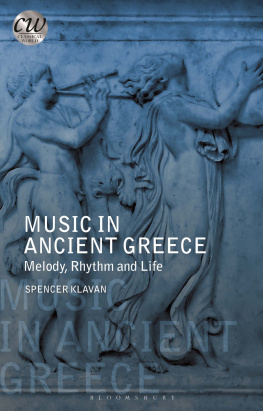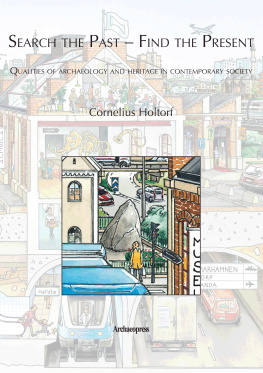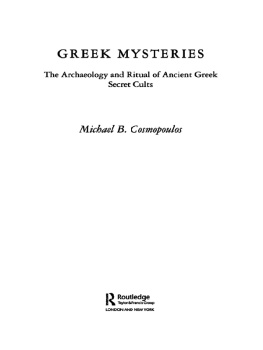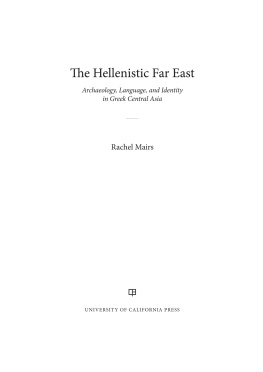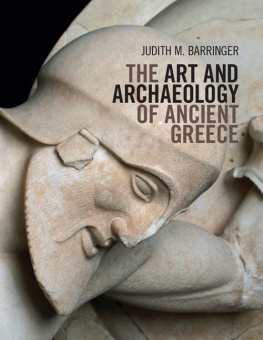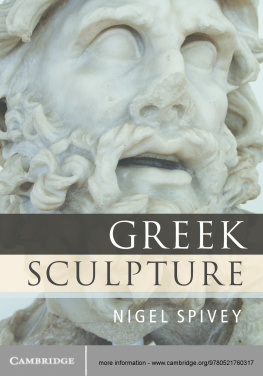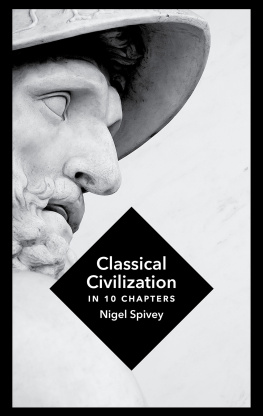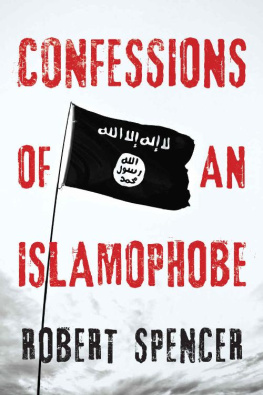TIME, TRADITION AND
SOCIETY IN GREEK
ARCHAEOLOGY
THEORETICAL ARCHAEOLOGY GROUP (TAG)
In this series:
The Archaeology o f Human Ancestry
Power, Sex and Tradition
edited by James Steele and Stephen Shennan
Cultural Identity and Archaeology:
The Construction o f European Communities
edited by Paul Graves-Broum, Sian Jones and Clive Gamble
Managing Archaeology
edited by Malcolm A . Cooper, Antony Firth, John Carman
and David Wheatley
Theory in Archaeology
A World Perspective
edited by Peter J. Ucko
TIME, TRADITION AND SOCIETY IN GREEK ARCHAEOLOGY
Bridging the Great Divide
Edited By Nigel Spencer
First published 1995
by Routledge
2 Park Square, Milton Park, Abingdon, Oxon, 0X14 4RN
Simultaneously published in the USA and Canada
by Routledge
270 Madison Ave, New York NY 10 0 16
Transferred to Digital Printing 2006
1995 Nigel Spencer and Contributors
All rights reserved. No part of this book may be reprinted or
reproduced or utilized in any form or by any electronic,
mechanical, or other means, now known or hereafter
invented, including photocopying and recording, or in any
information storage or retrieval system, without permission in
writing from the publishers.
British Library Cataloguing in Publication Data
A catalogue record for this book is available from the British Library
Library of Congress Cataloguing in Publication Data
A catalogue record for this book has been requested
ISBN 0-415-11412-8
CONTENTS
| Nigel Spencer |
| Jonathan M. Hall |
| Louise Steel |
| Nigel Spencer |
| James Whitley |
| Kyriacos Lambrianides |
| Lisa Nevett |
| Karen Stears |
| Lin Foxhall |
IILUSTRATIONS
| 1.1 |
| 3.1 |
| 3.2 |
| 4.1 |
| 4.2 |
| 4.3 |
| 5.1 |
| 5.2 |
| 5.3 |
| 5.4 |
| 5.5 |
| 5.6 |
| 5.7 |
| 5.8 |
| 5.9 |
| 6.1-14 |
| 6.15-20 |
| 7.1 |
| 7.2 |
| 7.3 |
| 8.1 |
| 8.2 |
| 8.3 |
| 8.4 |
| 8.5 |
CONTRIBUTORS
Nigel Spencer, the editor of the book, holds a Postdoctoral Research Fellowship at the Institute of Archaeology, Oxford and is also a Fellow of Worcester College, Oxford. Dr Spencer is conducting research into the northeast Aegean and western Turkey in addition to assisting in the directing of the Pylos Regional Archaeological Project in Messenia.
Lord Renfrew of Kaimsthorn is the Disney Professor of Archaeology in the Department of Archaeology, University of Cambridge. He has written many seminal works on European prehistory and conducted large amounts of fieldwork in Greece. Currently he is researching the theme of ethnicity in archaeology.
Jonathan M. Hall currently holds a Fellowship at Downing College, Cambridge where he is carrying out research into the theme of ethnicity in ancient Greece. It was at Cambridge and the British School in Athens that he conducted his doctoral research into early Iron Age Greece.
Louise Steel recently completed her PhD thesis at University College London on Cyprus in the early Iron Age and is continuing her research into the island at the University.
James Whitley is a lecturer in the School of History and Archaeology, College of Cardiff, where he is engaged in research into early Iron Age and Archaic Greece and the Aegean and is currently carrying out survey work in Crete.
Kyriacos Lambrianides is completing his PhD thesis at University College London which examined the Bronze Age in northwest Anatolia and the eastern Aegean. He has carried out survey work in Greece and Turkey and currently is conducting fieldwork in western Turkey.
Lisa Nevett holds a British Academy Postdoctoral Research Fellowship at the Department of Archaeology, University of Durham where she is conducting research into the analysis of field survey data from Boiotia. Previously she carried out doctoral research at Cambridge into the social and physical structure of Greek domestic houses.
Karen Stears is a lecturer in the Department of Classics, University of Edinburgh. Her doctoral research was undertaken at Kings College London and the British School in Athens and concerned the study of funerary reliefs and funerary practices in Classical Greece.
Lin Foxhall is a lecturer in the Department of Archaeology, University of Leicester. Her research interests range from anthropology to archaeology and classics, including special interest in the Greek countryside and landscape.
GENERAL EDITORS PREFACE
Why does Classical archaeology need theory? The purpose of the Theoretical Archaeology Group series is to answer the question by showing that archaeology contributes little to our understanding if it does not explore the theories that give meaning to the past. The last decade has seen some major developments in world archaeology and the One World Archaeology series provides a thematic showcase for the current scale of enquiry and variety of archaeological interests. The development of a theoretical archaeology series complements these thematic concerns and, by focusing attention on theory in all its many guises, points the way to future long-term developments in the subject.
In 1992 the annual Theoretical Archaeology Group (TAG) conference was held in Southampton. Europe and the world of archaeological theory was our theoretical theme at this EuroTAG conference. We stressed two elements in the structure of the three-day conference. In the first place 1992 had for long been heralded as the time when the single market would come into existence combined with moves towards greater European unity. While these orderly developments could be planned for and sessions organised around the role of archaeology and the past in the construction of European identity, no one could have predicted the horror of what would occur in former Yugoslavia. Throughout 1992 and beyond, the ideologies of integration and fragmentation, federalism and nationalism vied with each other to use the resources of the past in vastly different ways.
The second element recognised that 1992 was a notable anniversary for theoretical archaeology. Thirty years before, Lewis Binford had published his first seminal paper, Archaeology as Anthropology, in American Antiquity. This short paper was a theoretical beacon in an otherwise heavily factual archaeological world. From such beginnings came the influential processual movement which, in its early years, was referred to as the New Archaeology. Thirty years have clearly knocked the shine off such bright new futures. In the meantime archaeological theory had healthily fragmented while expanding into many areas of investigation, previously regarded as off-limits to archaeologists and their mute data. Processualism had been countered by post-processualism to either the enrichment or irritation of by now partisan theoretical practitioners. EuroTAG marked the anniversary with a debate involving the views of Lewis Binford, Chris Tilley, John Barrett and Colin Renfrew, supplemented by opinions from the floor. Their brief was to outline the theoretical challenges now set before the subject. The audience heard various programmes of where we might go as well as fears about an uncertain theoretical future. Both optimism and pessimism for another thirty years of theoretical excitement were to be found in almost equal measure. However, the clear impression, exemplified by the number of people, almost eight hundred, who attended EuroTAG was that the strength of any future theoretical archaeology now lies in its diversity.




